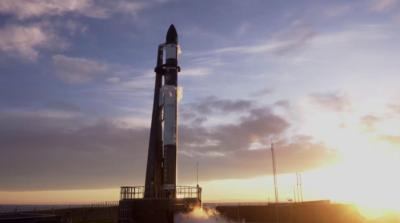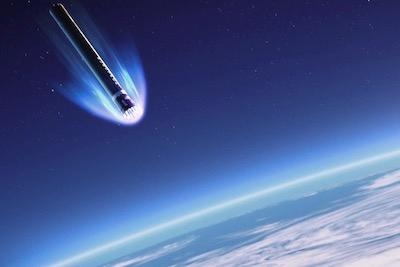Sat, Oct 23, 2021
Competes with SpaceX Multiuse Falcon
Rocket Lab has revealed its newest efforts refining its Electron rocket’s first stage recovery and reusability processes, during their next satellite delivery launch. After delivery of the second stage and payload towards its target, the first stage will complete a controlled descent, aided by parachutes, to a splashdown point in the ocean. On

ce there, their Ocean Recovery and Capture Apparatus (ORCA) system will retrieve the rocket and store it in its cradle for inspection and return to service. Their eventual goal is to capture a returning rocket mid-flight during its descent.
During the next launch, referred to as the “Love At First Insight” mission, Rocket Lab will deliver two Earth-observation satellites for global monitoring company BlackSky, sometime after November 11. The continued refinement of the Electron system is hoped to create a more robust, reusable, and reliable rocket with lower maintenance requirements after each successful mission. Changes to their operations will include closer chase helicopters to scout the touchdown point and begin recovery faster, with the rocket receiving improved heat shielding and a higher-deploying parachute system to provide a slower, longer descent. The data received will be analyzed for future aerial recovery efforts.

“As one of only two companies to recover an orbital-class booster from space, we’ve proven it’s possible to make Electron the world’s first orbital-class reusable small launch vehicle,” said Peter Beck, Rocket Lab founder and CEO. “We’ve perfected Electron’s controlled descent, demonstrated flawless parachute deployment, and successfully plucked stages from the ocean. Now we’re gearing up for the next stage – preparing to use a helicopter to catch a rocket as it descends to Earth from space. It’s ambitious, but with each recovery mission we’ve iterated and refined the hardware and processes to make the impossible ordinary. I’m excited to take what we learn from this launch and put it into practice with aerial capture missions in future.”
More News
From 2023 (YouTube Edition): "Ain’t Your Daddy’s Super Cub”—Don Wade Co-owned by Don and Ron Wade—the former of Don’s Dream Machines, a storied >[...]
Pilot-Rated Passenger Reported That The Pilot Did Not Adequately “Round Out” The Landing Flare And The Airplane Bounced And Yawed To The Right Analysis: The pilot state>[...]
Dead Reckoning Dead reckoning, as applied to flying, is the navigation of an airplane solely by means of computations based on airspeed, course, heading, wind direction, and speed,>[...]
Aero Linx: Lake Amphibian Club This website is created and sponsored by the Lake Amphibian Club, to help spread the word about these wonderful, versatile amphibians that can land j>[...]
“I am deeply honored to be sworn in as NASA administrator. NASA’s mission is as imperative and urgent as ever — to push the boundaries of human exploration, ignit>[...]
 Classic Aero-TV: In Praise of Alabamas Patriot Aircraft USA
Classic Aero-TV: In Praise of Alabamas Patriot Aircraft USA NTSB Final Report: Cirrus Design Corp SR22
NTSB Final Report: Cirrus Design Corp SR22 ANN's Daily Aero-Term (12.21.25): Dead Reckoning
ANN's Daily Aero-Term (12.21.25): Dead Reckoning ANN's Daily Aero-Linx (12.21.25)
ANN's Daily Aero-Linx (12.21.25) Aero-News: Quote of the Day (12.21.25)
Aero-News: Quote of the Day (12.21.25)




